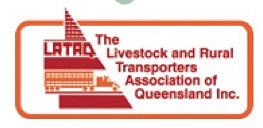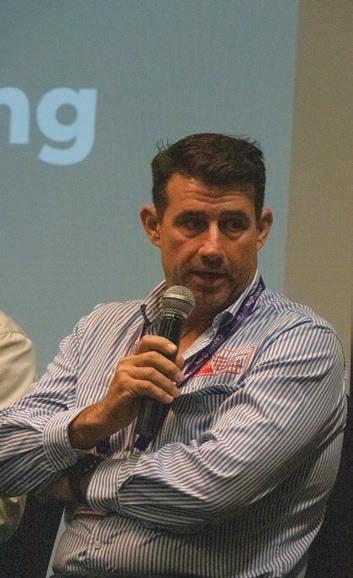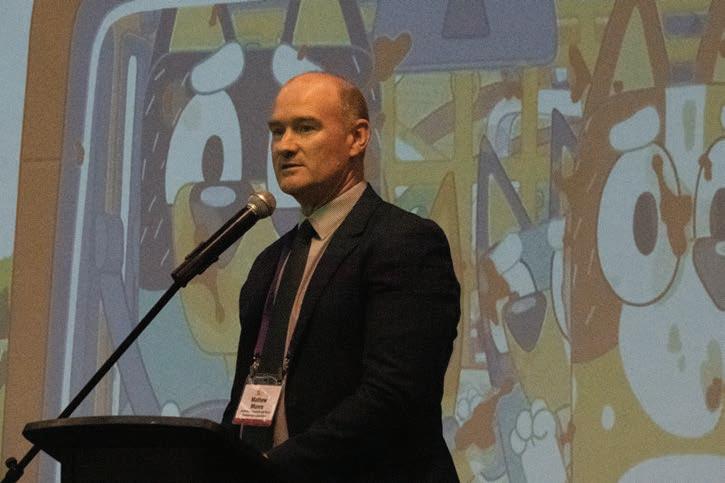
6 minute read
ALL ROADS LEAD TO ROMA
ALL ROADS
LEAD TO ROMA
In a period of stop/start lockdowns and limited social interaction, rural Queensland, which has remained relatively Covid-free, finally hosted the twice delayed annual conference of the Livestock and Rural Transporters Association of Queensland in Roma.
This year marks the 40th anniversary of the formation of the Livestock and Rural Transporters Association of Queensland. After its formation back in 1981 the rest of the states in Australia followed the original model used in Queensland, forming organisations representing livestock transporters across the country.
Then this grouping of livestock transporters decided to create an organisation which would represent all of the of states associations federally, the organisation again developed a new model. The formation the Australian Livestock Transporters Association (as it was then) structure would later be followed by the rest of the Australian transport industry when forming the national association representing trucking interests, which is now known as the Australian Trucking Association.
The connection here being Bruce McIver, who was involved in that first meeting of the Queensland Association back in 1981, becoming this association’s first president. He was then later involved in the formation of the ALTA and, became its first president. Later, his involvement in the formation of what would become the ATA, lead to the organisation following the ALTA’s model and also appointing him as its first chairman.
Leaving history aside, the job of the conference in Roma was to represent the needs and wishes of the LRTAQ both on a state and national level. As is quite often the case in conferences concerning the livestock and rural road transport industries, there was a diverse selection of politicians in the room.
Present was Scott Buchholz, Federal Assistant Minister for Road Safety and Freight Transport, Queensland Senator Susan McDonald, Queensland MP Kim Richards, representing Transport Minister, Mark Bailey, plus Steve Minnikin, Queensland Shadow Minister for Transport and Main Roads and local Mayor Sean Dillon.
“Perhaps the greatest challenge to the Queensland livestock transport industry at the moment, and this is probably true throughout our national association is a shortfall in our workforce and attracting drivers and other people,” said Gerard Johnson, LRTAQ President. “We need to find ways to attract them into the industry and at the moment we have improve efficiency to take up the slack caused by the lack of labour available.”
These sentiments were echoed by a local politician, Barcaldine Regional Council Mayor, Sean Dillon.
“I thank god that the Queensland beef industry is a couple of million head down and there’s been a big shift towards feedlotting, because if and when we go back to moving large numbers of grass-fed slaughter cattle, you won’t have enough trucks,” said Sean. “If you do have enough trucks, you won’t have enough drivers. Short of fixing the human resources issue, having bigger combinations moving further than they currently can is a solution, or a stop-gap solution.”
For the perspective from the national agenda the conferene heard from an LRTAQ stalwart and ALRTA Vice President, Ian Wild.
“These are testing times,“ said Ian. “We’ve had droughts, fires, floods, trade wars and a global pandemic, but Australia has pulled through remarkably well. After experiencing shortages of farm and consumer necessities, Australians now better recognise the essential role of the trucking industry in this country.
“Moving drought-stricken stock to better pasture, delivering fodder after fires, emergency livestock movements or just restocking toilet paper at the supermarket, there are people who thank you dearly.
“When truck stop cafes and showers were forced to close, we were the first to raise the issue with government, and get these places operating again. When border crossing rules were unworkable, we sought improvements.”
It has been two years since the last LRTAQ conference, so there was a lot to catch up on for Mathew Munro, the ALRTA Executive Director, as he brought the Queenslanders up to date with other issues on the national scene.
2021 Young Person in Transport Award winner, Damien Swalling, from Swalling Livestock Transport.

One of the big wins has been the removal of the rule to include the vehicle registration of the truck doing the work, on livestock Class 3 movement permits. This has made it possible to get permits in advance, as any truck of the correct size is covered by the permit. It is no longer a difficult last minute application process for farmers and livestock transporters.
“In November last year, Standards Australia published a national ramp standard,” said Mathew. “Loading and unloading is the most dangerous part of the job. Our ramp guide was published in 2015 and after an unfortunate death in Victoria, the coroner there said there should be a standard for ramp design and condition.
“We sat down with Standards Australia, it was a whole of supply chain discussion. That standard has now been published and the committee received the ‘Outstanding Committee Award’ from Standards Australia for its work.
“Again, awareness is key. While the standard is out there, we need people to get the message out there. We are really relying on our members to get the word out.”

THE BULL CARTERS BALL The traditional highlight of this event is the Bull Carters Ball and the evening saw the awarding of the 2021 Young Person in Transport Award to Damien Swalling, from Swalling Livestock Transport.
This award has developed to recognise and acknowledge the contribution younger transport workers are making to the sustainability of the industry. Member businesses of the LRTAQ have been encouraged to recognise excellence in their workplace and nominate outstanding individuals aged 35 years or younger.
“Each of these individuals displays pride and professionalism in their career, demonstrates a passion for our industry and has a strong desire to advance within it,” said, Gerard Johnson on the night. “They are a credit to our industry and I’m looking forward to promoting their stories to encourage other young people to consider a career in rural transport.
“The average age of a driver these days is over 50, and in order to secure the future of our food and fibre supply chains we need to get serious about bringing younger people into the industry. Our six finalists are the proof in the pudding that this is a great industry to both earn a living and forge a rewarding career in.”

SAFE CROSS LOADING OF CATTLE In livestock transport, transferring cattle between road train crates, in the traditional sense, is considered one of the most dangerous activities for both drivers and livestock along the transport supply chain.
During the LRTAQ event, fuel supplier IOR officially opened a new cattle cross loader at its Roma fuel stop, about six kilometres West of the main town. The cattle cross loader facility removes the safety risk of traditional cattle cross loading in Roma and is open, free of charge, for use by IOR customers and other livestock transport drivers.
IOR says it is committed to the Health and Safety of team members, contractors, customers, and Australian communities, and Roma has been selected for this safety initiative as it is the home of the largest livestock selling centre in the Southern Hemisphere.
The facility has been modelled on IOR’s existing cattle cross loader facility in Port Augusta, South Australia.
LRTAQ stalwart and ALRTA Vice President, Ian Wild.
Mathew Munro, ALRTA Executive Director. Gerard Johnson, LRTAQ President.








